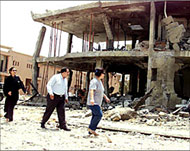Saudi defends slow reform pace
Political reforms must remain true to Islamic values, says Saudi Arabia’s interior minister, who argues the kingdom’s lack of democracy cannot justify recent attacks by armed groups.

Interior Minister Prince Nayif Bin Abd al-Aziz told the pan-Arab al-Hayat daily in an interview published on Wednesday that the kingdom was not against political reform, but could not import Western-style democracy in the conservative kingdom.
“The meaning of reform must be defined according to our foundations and needs,” he said.
“Some use reform as a means to achieve aims which may oppose national interests and this is not logical. Others see reform as abandoning our Islamic values and foundations and this is rejected. And it is also unacceptable for some to believe that reform is about resisting development and confronting others.”
Riyadh has come under harsh criticism abroad to reform its
rigid political system and quash armed groups since the 11 September 2001 attacks on the US, blamed mostly on Saudis.
Pressure to act grew after triple bombings in the kingdom on 12 May left 35 people dead.
Towards democracy
The kingdom took its first real steps towards reform last month with the announcement of its first polls to vote for municipal councils.
 |
|
Saudi clamped down on armed |
But Saudi reformists had called for more, including a
constitutional monarchy and an elected parliament. Following the announcement of municipal elections, some Saudis staged illegal demonstrations to call for more freedom and were arrested.
The kingdom, the birthplace of al-Qaida leader Usama Bin
Ladin, had also responded to Western disquiet about its
restrictive political, social and religious culture by scrapping
school teachings that promoted hatred of Christians and Jews and firing hundreds of clerics for inciting dissent.
But the Saudi interior chief rejected accusations of abuses by human rights groups. “While we don’t claim perfection, we are at the forefront of those who defend human rights,” he said
Robust clampdown
Saudi Arabia also launched a robust clampdown on armed groups, following the Riyadh bombings. According to the minister, Riyadh’s fight against terrorism had been “fruitful” with the arrest of 600 people.
The minister said there was a “good level of coordination”
between Saudi Arabia and the United States in the anti-terror fight and described ties between the two countries as “historic”.
He said Saudi border guards were “permanently monitoring” the border with Iraq to prevent any infiltration by presumed terrorists into the war-torn nation.